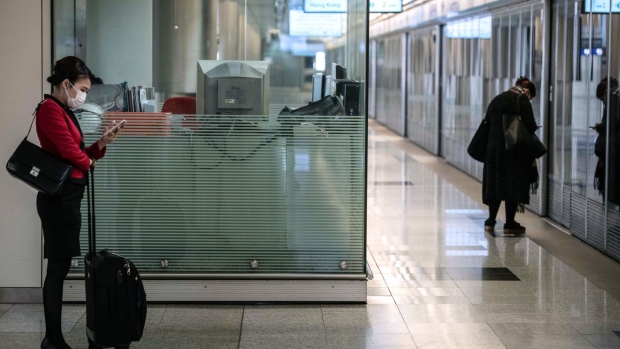Feb 24, 2020
Mastercard sees lower revenue growth as coronavirus curbs travel
, Bloomberg News

Mastercard Inc. lowered its three-week-old forecast for quarterly revenue growth as the spreading coronavirus curbs international travel and even takes a bite out of e-commerce, a business executives had hoped would be immune.
The credit-card network said it’s knocking 2 to 3 percentage points off the prediction it made on an earnings conference call Jan. 29. That translates to growth of 9% to 10% on a currency-neutral basis, excluding acquisitions, it said Monday. Shares of Mastercard and Visa Inc. dropped in after-hours trading.
“Cross-border travel, and to a lesser extent cross-border e-commerce growth, is being impacted,” Mastercard said in a statement. “There are many unknowns as to the duration and severity of the situation and we are closely monitoring it.”
The short-lived forecast underscores how quickly the virus is altering consumer behavior as it moves beyond China. Mastercard executives had previously taken comfort in the fact that much of the firm’s business into and out of China is e-commerce, which could potentially continue amid measures to contain the disease.
“It provides some level of a hedge,” Chief Financial Officer Sachin Mehra had told analysts on Jan. 29. But even back then, Chief Executive Officer Ajay Banga quickly cautioned that the firm would “take a look at those numbers once again” if the crisis worsened and affected more parts of the globe.
On Monday, United Airlines Holdings Inc. withdrew its 2020 profit forecast, also citing the virus.
Mastercard’s shares fell 4.4% during regular trading Monday after a spike in infections in countries including South Korea and Italy triggered a global selloff. The stock then dropped an additional 1.1% after hours at 6:30 p.m. in New York. Visa fell 1.7%.
If the impact of the virus is limited to the first quarter, annual net revenue growth will probably be at the low end of the low-teens range, the company said on Monday, noting that it plans to give further updates on its next earnings call.
Visa CEO Al Kelly told investors at his company’s investor day Feb. 11 that it was “too early to tell” what impact the virus might have on results.
“But if planes are not flying in and out of China, if hotels are not being filled -- which they’re not at the moment -- and if the supply chains are being impacted -- which I suspect they are -- there is going to be some impact,” Kelly said.


